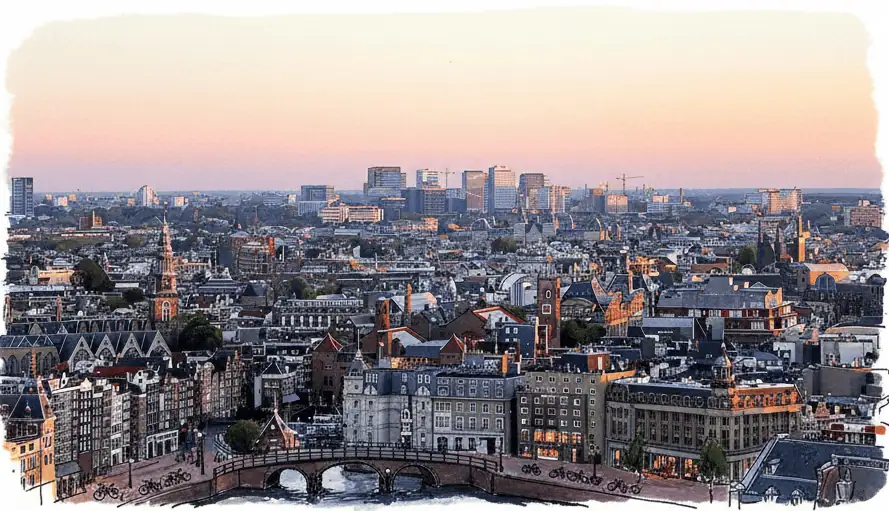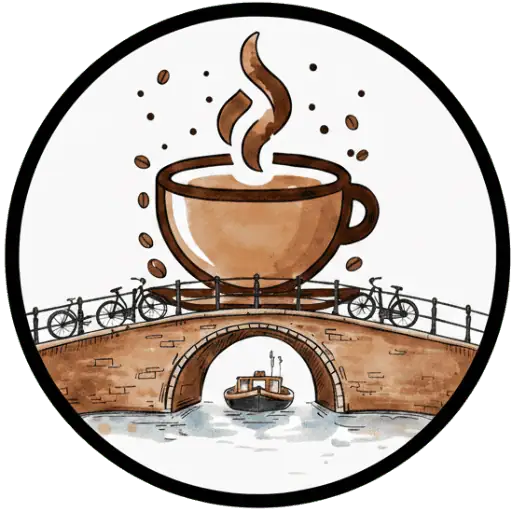
North Holland has breathed coffee since 1661. From the first Amsterdam coffee houses to Bocca and Friedhats today, the province keeps innovating with festivals, home baristas and circular projects. Taste, community and sustainability form the constant blend that also inspires enthusiasts beyond the province.
Roasters in North Holland
Cities in North Holland

Amsterdam
Since 1661, Amsterdam has grown from its first coffeehouse into a vibrant third‑wave scene where festivals, circular start‑ups and coworking cafés show how history, innovation and sustainability meet in every cup. Every day baristas fill mugs while lightly roasted single origins reveal floral flavors.
More about North Holland
Brief introduction
Coffee and North Holland have belonged together for more than three centuries. Trade, innovation and conviviality are the common thread. This article offers a quick yet complete overview for everyone who wants to understand the regional coffee world.
From exclusive drink to daily ritual
Amsterdam received its first recorded shipment of coffee beans in 1661. Within four years the first coffeehouse opened. Initially coffee was reserved for the elite, but thanks to VOC trade with Java and Suriname the drink became widely affordable in the eighteenth century.
Coffeehouses blossomed around 1720, even paying extra taxes, and later disappeared when people began brewing at home. Amsterdam inventories from the middle of the century list many coffee pots and grinders, evidence of a growing home‑coffee culture.
In the twentieth century 'going for coffee' became a social norm. Filter coffee with a biscuit remained the default, while brands such as Douwe Egberts became household names. The recent third wave has brought espresso, latte art and micro‑roasteries to the provinces.
Specialty roasters set the tone
North Holland is home to several pioneers who combine quality and ethics. Their beans sit in cafés, supermarkets and kitchen cupboards across the country.
- Bocca Coffee, founded in 2001, oversees the entire bean‑to‑cup process and carries a B‑Corp certification.
- White Label Coffee from Amsterdam‑West guarantees fair prices throughout the entire chain.
- Friedhats, led by barista champion Lex Wenneker, roasts rare micro‑lots and delivers in reusable bottles.
- Brandmeester’s has roasted small batches daily since 1994, linking quality to farmer welfare.
- Zwarte Roes from Zwaag packs single‑origin beans in biodegradable material and ships nationwide subscriptions.
- White Label Coffee from Amsterdam‑West guarantees fair prices throughout the entire chain.
- Friedhats, led by barista champion Lex Wenneker, roasts rare micro‑lots and delivers in reusable bottles.
- Brandmeester’s has roasted small batches daily since 1994, linking quality to farmer welfare.
- Zwarte Roes from Zwaag packs single‑origin beans in biodegradable material and ships nationwide subscriptions.
These roasters show that flavour, transparency and sustainability go hand in hand. Their success inspires new entrepreneurs in Haarlem, Alkmaar and Hoorn.
Events that strengthen the community
The Amsterdam Coffee Festival draws more than 12,000 visitors to the NDSM‑loods over three days each year. Workshops, music and 125 exhibitors fill the hall with aromas and new ideas.
Barista talent comes together during the Dutch Coffee Championships at the RAI. Winners represent the Netherlands on the world stage, promoting the province as a coffee hub.
Smaller‑scale initiatives, such as The Coffee Connect Club in Zaanstad, combine art, live music and local roasters. Such gatherings ensure that a vibrant coffee culture also grows outside the capital.
What do North Hollanders drink?
With an average of 8.4 kg of coffee per person per year, the Dutch rank in the global top five. Traditionally the simple “bakkie” with a biscuit remains popular, yet people are increasingly looking for distinctive flavours.
Espresso bars and trendy filter bars are gaining ground in Haarlem and Alkmaar. Consumers ask about origin, roast date and brewing methods, pushing cafés to elevate barista skills and latte art.
At home, the “home‑barista” is on the rise. Since the pandemic, sales of espresso machines, grinders and pour‑over sets have increased. Living rooms now host complete coffee corners where cappuccinos proudly appear on Instagram.
Sustainability as a core ingredient
– The Max Havelaar Fairtrade label launched in 1988 in the Netherlands and remains influential.
– The province and municipalities source office coffee 100 percent sustainably.
– Start‑ups use spent coffee grounds as feed for oyster mushrooms or as biofuel.
– Roasteries such as Victorieboontje deliver by cargo bike and minimize CO₂ emissions.
– The province and municipalities source office coffee 100 percent sustainably.
– Start‑ups use spent coffee grounds as feed for oyster mushrooms or as biofuel.
– Roasteries such as Victorieboontje deliver by cargo bike and minimize CO₂ emissions.
Such initiatives show that flavour does not have to come at the expense of people or planet. Every cup contributes to a circular economy, from bean to spent coffee grounds.
Outlook
North Holland combines centuries‑old coffee passion with modern trends. Established rituals endure, while new flavours, techniques and sustainability solutions continually emerge. The province therefore remains an inspiring place for aficionados and professionals alike.
